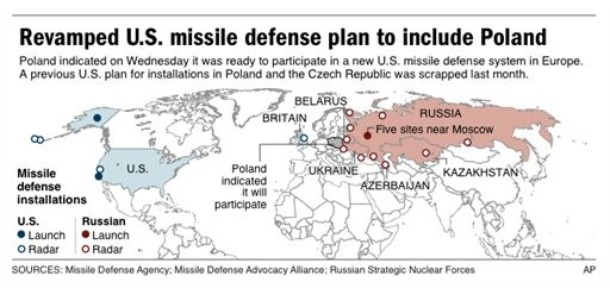
From Sam Nunn, Igor Ivanov, and Wolfgang Ischinger, the International Herald Tribune: No other initiative has more near-term potential to ease the NATO-Russian relationship out of its petulant, impacted state, while giving a positive jolt to the revived but tentative and unfocused interest in an improved and more inclusive European security system, than missile-defense cooperation.
Were North America, Europe and Russia to make defense of the entire Euro-Atlantic region against potential ballistic missile attack a joint priority, they would — apart from addressing a concrete problem — in a single stroke undermine much of the threat analysis that sets Russia against NATO, and prove that trilateral cooperation on a key security issue is possible. …
NATO Secretary General Anders Fogh Rasmussen last March moved three-way cooperation on missile defense to the very center of his proposed agenda, stressing the importance of creating “a missile-defense system that not only defends the Euro-Atlantic community, but one that also brings it together.”
No one thinks it will be easy. Years of thickening mistrust, differing threat analyses, and a deficit of political will still weigh on the prospects for cooperation — notwithstanding the recent improvement in U.S.-Russian relations.
Nor are the technical obstacles trivial. For both practical and political reasons a fully integrated system with joint command and control may be a reach too far. Even separate but coordinated systems, the model experts think more likely, pose formidable challenges. …
The necessary political will, however, will almost certainly not emerge where it must — among all three parties, North America, Europe and Russia — unless the process, the system and its implementation are of, by and for all three.
It will not come if a missile-defense system is essentially the creation of a single country with invited participation, or the work of two countries, or the project of an alliance. From the start, Europe, North America and Russia should assess jointly the common threat, and then undertake as equal parties to design from the ground up a common architecture to deal with the threat. …
Because the stakes are this high, we, voices from not one or two countries but from all parts of the Euro-Atlantic region, are concerned that this moment of opportunity not slip by, or be sabotaged by narrow-minded concerns, or take a back seat to things easier done.
Sam Nunn, for 24 years a Democratic U.S. Senator from Georgia, is co-chairman of the Nuclear Threat Initiative. Igor Ivanov was Russia’s foreign minister from 1998 to 2004. Wolfgang Ischinger, a former German ambassador to Britain and the United States, is chairman of the Munich Security Conference. They are co-chairmen of the European-American Security Initiative commission. (graphic: AP)
Image: ap%207%2022%2010%20%20missile%20defense%20installations.jpg
